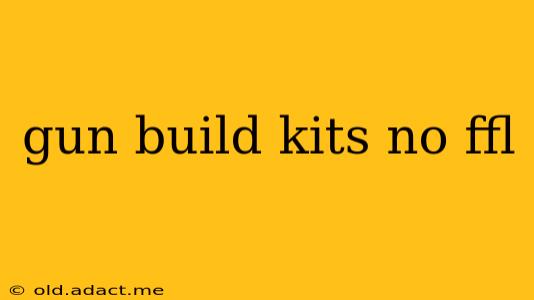Building your own firearm can be a rewarding experience, offering a level of customization unavailable with commercially produced guns. However, navigating the legal landscape surrounding gun build kits, especially those that don't require a Federal Firearms License (FFL) holder, can be tricky. This guide aims to clarify the regulations and help you understand what's permissible and what's not. Disclaimer: This information is for educational purposes only and should not be considered legal advice. Always check your state and local laws before undertaking any firearm construction project. Federal and state laws are constantly evolving, so staying updated is crucial.
What are Gun Build Kits?
Gun build kits typically contain the necessary components to assemble a firearm, excluding the receiver, the part considered the firearm's "serialized" part by the ATF (Bureau of Alcohol, Tobacco, Firearms and Explosives). These kits often include barrels, stocks, triggers, and other parts. The buyer is responsible for sourcing the receiver separately. This is where the legal complexities arise.
Do I Need an FFL to Buy a Gun Build Kit?
Generally, no, you do not need a licensed FFL dealer to purchase a gun build kit as long as the kit does not include a receiver. The sale of individual gun parts, excluding the receiver, isn't subject to the same regulations as the sale of complete firearms. However, the assembly and eventual possession of a completed firearm still fall under the purview of federal and state gun laws.
What is a Receiver? Why is it so important?
The receiver is the main body of a firearm, housing the firing pin and other critical components. The ATF considers the receiver the "firearm" itself, as it's the part that's uniquely serialized for identification and tracking purposes. Because of this, the sale and transfer of receivers are heavily regulated.
Can I Build a Gun From Parts Without an FFL?
The answer is complex and depends heavily on how you acquire the receiver. If you purchase a receiver from an FFL holder, you'll be subject to background checks and other legal requirements. If you manufacture your own receiver, you might not need to go through an FFL, but you need to be aware of very strict laws and ATF regulations regarding manufacturing firearms at home. This can become extremely complicated and may even require registration of the finished firearm, depending on your state and the type of firearm.
What are the Legal Ramifications of Building a Gun from a Kit?
Improperly assembling or possessing a firearm, even one constructed from a kit, can lead to serious legal consequences, including hefty fines and imprisonment. It’s crucial to understand and comply with all federal, state, and local laws concerning firearm ownership and assembly. Failure to do so can result in criminal charges.
80% Lower Receivers: What are they?
80% lower receivers are unfinished receivers that haven't yet been machined to the point of being considered a "firearm" by the ATF. They require further milling or machining to become functional receivers. Because they are not yet classified as firearms, their sale and purchase are usually not subject to the same regulations as complete receivers. However, once they are completed, they become subject to all applicable laws.
What are the Responsibilities of the Builder?
The builder of a firearm bears full responsibility for ensuring the firearm is built and used legally. This includes adhering to all applicable safety regulations and possessing the necessary licenses or permits where required. Improper assembly or use could lead to accidental injury or death, and the builder would likely face legal liability.
Is it Legal to Build a Ghost Gun?
"Ghost guns" are homemade firearms that lack serial numbers and are not registered with any government agency. While the legality of building a ghost gun varies by state, federal regulations generally require that completed firearms have serial numbers and be legally registered, regardless of how they were assembled. This means a firearm constructed from a kit is often considered a ghost gun if it lacks proper serial numbers and registration.
This information is for educational purposes only and does not constitute legal advice. Always consult with legal professionals and relevant authorities to ensure compliance with all applicable laws. The landscape of firearm regulations is complex and prone to change. Always double-check your state and local laws before proceeding with any firearm construction.
